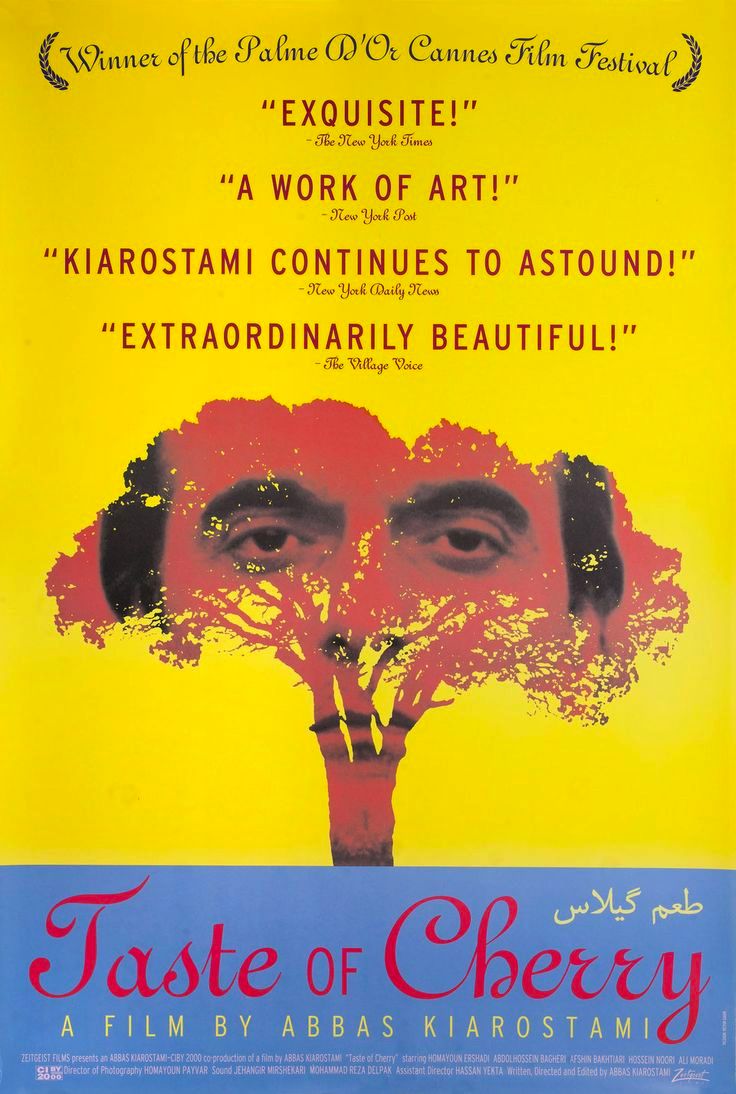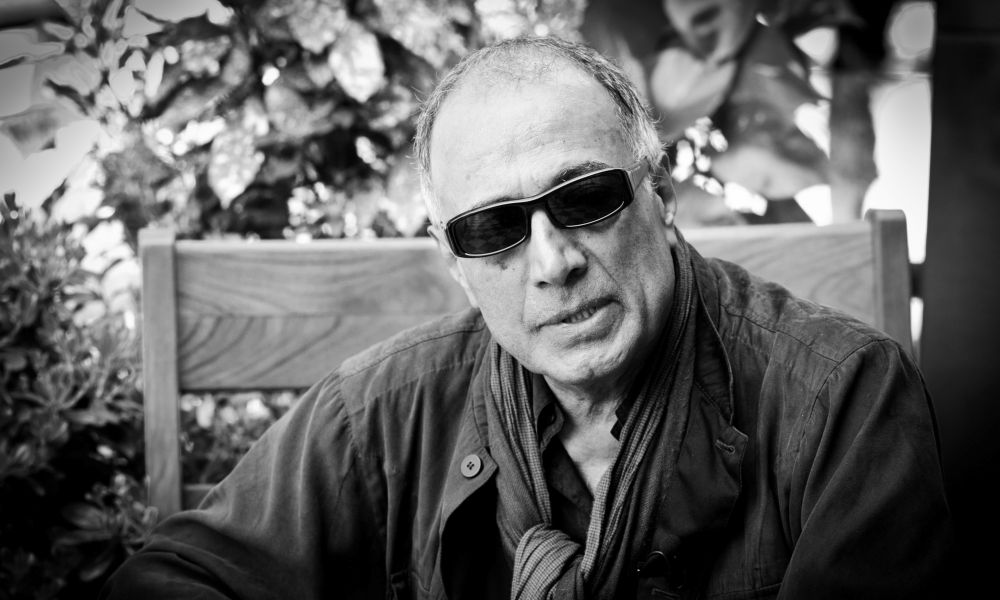"Employing simple imagery of daily life with an emphasis on the Iranian landscape, Kiarostami is a master of using visual imagery to convey abstract philosophical ideas and his characters’ inner struggles of the soul." - Mita Lad (Schirmer Encyclopedia of Film, 2006)
Abbas Kiarostami
Director / Screenwriter / Editor / Producer / Cinematographer
(1940-2016) Born June 22, Tehran, Iran
Top 250 Directors / 21st Century's Top 100 Directors
(1940-2016) Born June 22, Tehran, Iran
Top 250 Directors / 21st Century's Top 100 Directors
Key Production Countries: Iran, France
Key Genres: Drama, Documentary, Short Film, Docudrama, Slice of Life, Avant-garde/Experimental, Culture & Society
Key Collaborators: Marin Karmitz (Producer), Ali Reza Zarrin (Producer), Charles Gillibert (Producer), Farhad Saba (Cinematographer), Farhad Kheradmand (Leading Actor), Nathanaël Karmitz (Producer), Homayun Payvar (Cinematographer), Mahmoud Kalari (Cinematographer), Ali Reza Zarrindast (Cinematographer), Morteza Rastegar (Cinematographer), Peyman Yazdanian (Composer), Kheda Barech Defai (Character Actor)
Key Genres: Drama, Documentary, Short Film, Docudrama, Slice of Life, Avant-garde/Experimental, Culture & Society
Key Collaborators: Marin Karmitz (Producer), Ali Reza Zarrin (Producer), Charles Gillibert (Producer), Farhad Saba (Cinematographer), Farhad Kheradmand (Leading Actor), Nathanaël Karmitz (Producer), Homayun Payvar (Cinematographer), Mahmoud Kalari (Cinematographer), Ali Reza Zarrindast (Cinematographer), Morteza Rastegar (Cinematographer), Peyman Yazdanian (Composer), Kheda Barech Defai (Character Actor)
"The fact that Iranian cinema is considered one of the best in the world is mainly due to Abbas Kiarostami, whose films play brilliantly with audiences' perceptions of cinema... Although Kiarostami has said, "I don't invent material. I just watch and take it from the daily life of people around me, " his realism is carefully constructed." - Ronald Bergan (Film - Eyewitness Companions, 2006)
"Kiarostami studied fine art and worked as a graphic designer before making his directorial debut with The Bread and the Alley (1970). A key figure in Iranian film-making, he eschews conventional narrative and professional actors to offer deceptively simple poetic reflections on everyday life and death in his country." - Chambers Film Factfinder, 2006

Close-Up (1990)
"The films of Iranian master Kiarostami, while succeeding partly as oblique but illuminating reflections of his country's recent history, occupy a more fertile territory somewhere between documentary and self-reflexive, modernist drama... Kiarostami's humane compassion for his characters shines bright, his simple compositions and stories and long takes a mark of deep respect for their quiet integrity and strength of spirit." - Geoff Andrew (The Director's Vision, 1999)
"Known for single-handedly putting Iran on the map of international cinema, Abbas Kiarostami’s filmmaking style was shaped by a variety of Persian arts, especially poetry. Reframing the world and the relationships between individuals through his creative involvement with actors—often amateurs, often children—and showing a keen eye for the beauty of landscapes, he produced philosophical works that reinvigorated the genres of documentary and narrative fiction… As with many filmmakers who carry within themselves experiences of living and working through political upheavals and personal tragedies, Kiarostami found a balance between pure cynicism and deep humanism in his work, as it continually questioned life and cinema." - Ehsan Khoshbakht (Harvard Film Archive, 2020)
"Kiarostami gained recognition in the West from the late eighties with films such as Close-Up (1989), the true story of a film buff who impersonates a famous director, and Through the Olive Trees (1994), part of a trilogy about an earthquake-struck village; but he first began making films in the Shah's day. Often compared to Satyajit Ray, Vittorio De Sica and Eric Rohmer, his films are admired for the poetic simplicity with which they tackle some of life's most complex issues." - The Movie Book, 1999
"With minimal dialogue, non-professional actors, and practically no written script, Abbas Kiarostami plots an innocent world where modest characters live complex, layered lives. While Kiarostomi mixes documentary and fiction fluently, he admits his failure in revealing the “truth” through cinema. But this search takes him from one film to another. Born and based in Teheran, Iran, Kiarostami started making films in the early 1970s, when he founded the film department of the Centre for Intellectual Development of Children and Young Adults." - Akram Zaatari (BOMB Magazine, 1995)
"Abbas Kiarostami is a fascinating figure. He represents a country that may be regaining its imagination. We need to attend. But if this is modern movie mastery, then our medium is gone and this is funerary art." - David Thomson (The New Biographical Dictionary of Film, 2002)
"A poet, painter and photographer, Abbas Kiarostami is a minimalist master, the finest filmmaker to emerge from the specific cultural conditions prevalent in Iran at the end of the twentieth century and arguably the most formally adventurous director of his generation. At first blush, it's easy to underestimate his slow, subtle cinema, predicated as it is on long fixed-camera shots, minimal cutting, naturalistic mise en scène, and a syntax of repetition and elision." - Tom Charity (The Rough Guide to Film, 2007)
"Kiarostami’s achievement rests on a complex combination of factors, one of which is that his films can be utterly, beautifully simple. Kiarostami is a humanist artist, with a strong commitment to stories of ordinary life. "My technique is similar to collage," he has said. "I collect pieces and put them together. I don’t invent material. I just watch and take it from the daily life of people around me." - Robert Horton (International Dictionary of Films and Filmmakers, 2000)
"I can watch films and say how technically beautiful they are, but I'm not impressed by any technicality." - Abbas Kiarostami
Selected Filmography
{{row.titlelong}}
GF Greatest Films ranking (★ Top 1000 ● Top 2500)
21C 21st Century ranking (☆ Top 1000)
T TSPDT R Jonathan Rosenbaum S Martin Scorsese
21C 21st Century ranking (☆ Top 1000)
T TSPDT R Jonathan Rosenbaum S Martin Scorsese
Abbas Kiarostami / Fan Club
Jonathan Rosenbaum, Jeffrey M. Anderson, Geoff Andrew, Jean-Michel Frodon, Michael Haneke, Fernando G. Varea, Adrian Martin, Filipe Furtado, Inácio Araújo, Richard Brody, Tina Hassannia, Nadav Lapid.
Jonathan Rosenbaum, Jeffrey M. Anderson, Geoff Andrew, Jean-Michel Frodon, Michael Haneke, Fernando G. Varea, Adrian Martin, Filipe Furtado, Inácio Araújo, Richard Brody, Tina Hassannia, Nadav Lapid.
"Fan Club"
These film critics/filmmakers have, on multiple occasions, selected this director’s work within film ballots/lists that they have submitted.
These film critics/filmmakers have, on multiple occasions, selected this director’s work within film ballots/lists that they have submitted.


